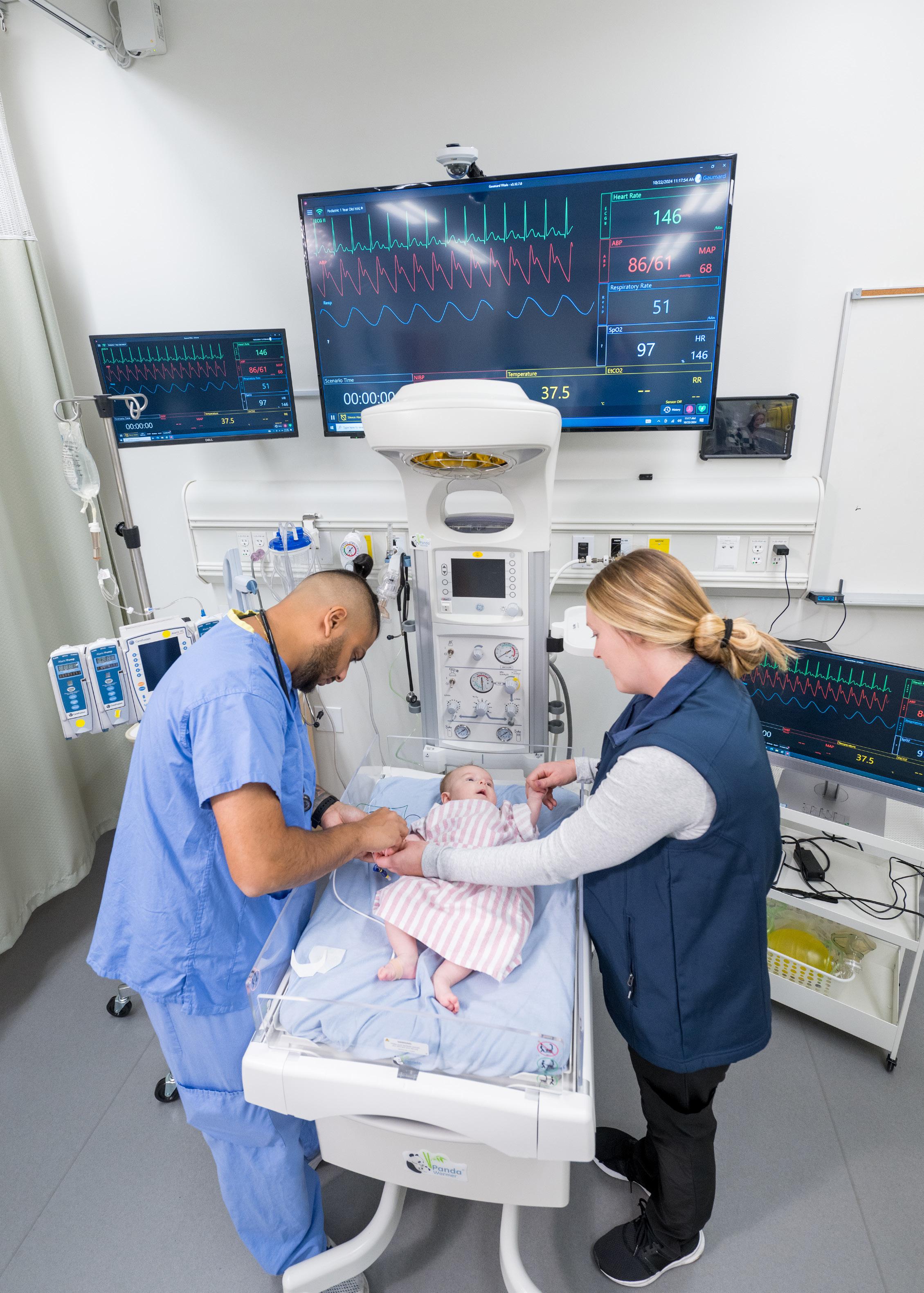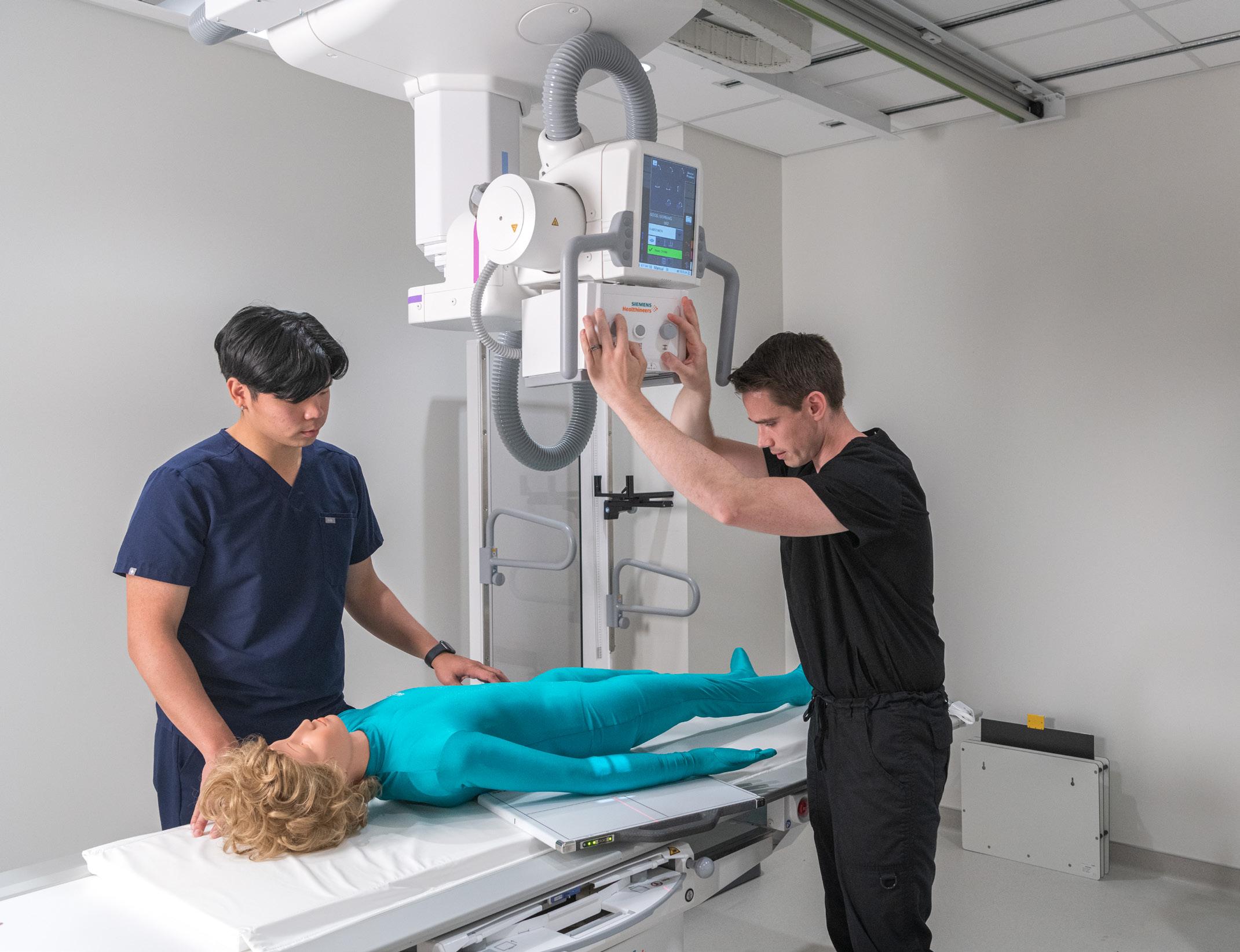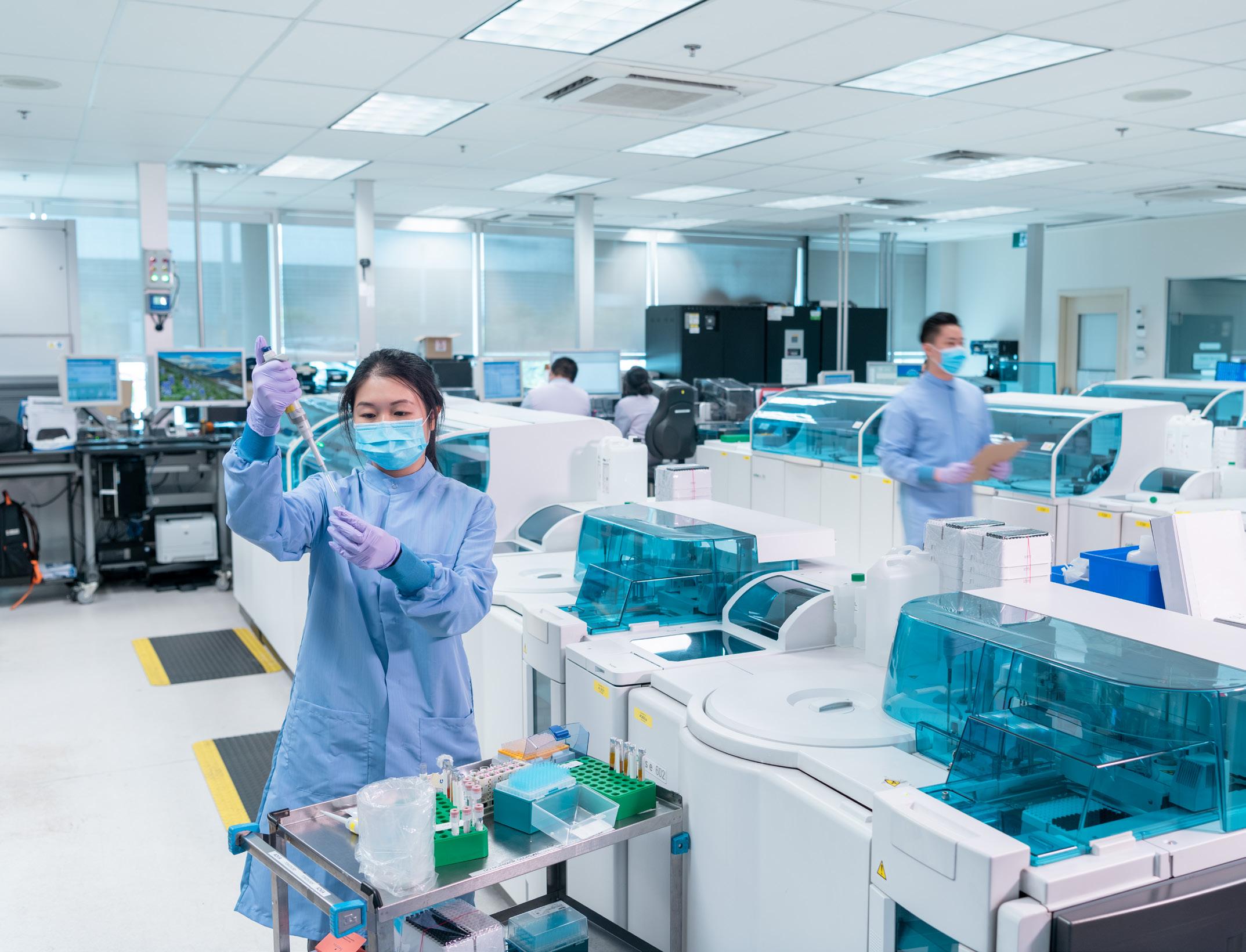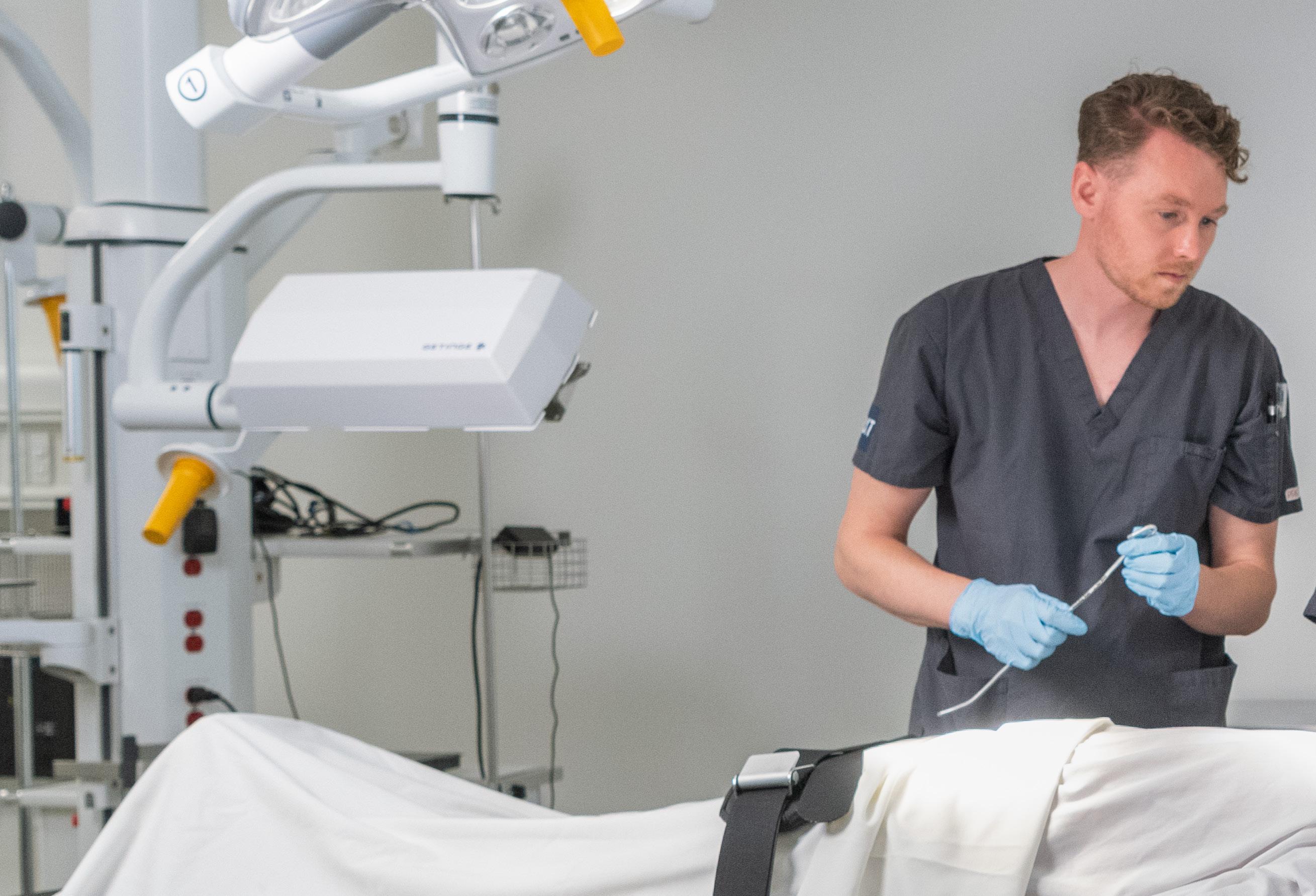A BCIT pediatric emergency nursing specialty student and faculty practice assessments on an infant patient at the Burnaby Campus. —
SCHOOL OF HEALTH SCIENCES EDUCATION
FOR A COMPLEX WORLD.
Program Guide


A BCIT pediatric emergency nursing specialty student and faculty practice assessments on an infant patient at the Burnaby Campus. —
FOR A COMPLEX WORLD.
Program Guide

Immerse yourself in a learning experience.
BCIT School of Health Sciences provides industry-leading education for essential, in-demand careers in the healthcare field. With over 30 programs available in a variety of disciplines, a world of opportunity awaits those seeking to pursue a highly rewarding and challenging career that makes a difference.
From Environmental Public Health to Occupational Health and Safety, Radiation Therapy, and Specialty Nursing, you will learn from industry practitioners and get real-world experience. Students are job-ready with 92%* of health science degree grads and 98%* of diploma grads finding employment in a related job.
On our Burnaby Campus, students learn in our exciting state-of-the-art Health Sciences Centre. Sophisticated simulation and collaborative learning spaces replicate real world workflows and prepare students for a seamless transition into their clinical and work environments. Walk out of this adaptive training facility and into the heart of the healthcare community.
*BC Student Outcomes Degree, prepared by BC Stats (2023) and BC Student Outcomes DACSO, prepared by BC Stats (2023)
BCIT Health Sciences students learn real life scenarios through simulation in our Health Sciences Centre.

BCIT School of Health Sciences allows you to experience authentic and complex clinical scenarios in a safe, learnercentered environment. Develop your role as a health care professional through simulated classroom learning—before performing skills in a clinical environment. Our simulation experiences help ensure our graduates transition from students to professionals with the skills needed to care for people in BC.

Find the best way forward.
The Diagnostics and Advanced Practices programs provide hands-on training in several diagnostic and therapeutic disciplines. Diagnostics graduates work in hospitals and clinics across BC and Canada.
Students are taught to combine technology with patient-centered care for a respectful, compassionate, and enhanced treatment experience.
Cardiology Technology students learn to perform non-invasive cardiology tests and analyze the electrical activity of the heart to help diagnose cardiac abnormalities. This program is delivered in a blended format consisting of online and in-person learning. Graduates are prepared to collaboratively care for patients as part of a healthcare team, as well as to ladder into advanced certificates, including Cardiovascular Technology, Electrophysiology Technology, and Cardiac Rhythm Device Technology.
Cardiovascular perfusionists are an integral part of the cardiovascular surgical team and are trained to operate highly specialized cardiopulmonary bypass machines during open-heart and cardiovascular surgical procedures. Perfusionists control the heartlung machine to meet the physiological needs of a patient during cardiac interventions and operate life-saving devices using extracorporeal membrane oxygenation. They work in diverse hospital settings including the operating room, emergency department, intensive care units, and vascular departments.
Magnetic resonance imaging, commonly known as MRI, utilizes powerful magnetic fields and radio waves to form images of the body to diagnose illness and injury. Students learn to provide non-invasive, diagnostic testing on almost every aspect of the human body, including bones, organs, muscles, and neurological functions.
The Medical Radiography program trains individuals in X-ray imaging. Students are trained in areas of general radiography, computed tomography [CT], fluoroscopy, operating room imaging, emergency/trauma, interventional procedures, and mammography.
Nuclear medicine uses biological tracers combined with radioactive material to produce images that help diagnose and manage disease. As a specialized branch of non-invasive diagnostic imaging, nuclear medicine stands out for its ability to detect subtle changes in the body’s function, allowing early detection of a wide range of disorders.
Radiation therapists employ focused beams of radiation to destroy tumours while minimizing harm to healthy tissues. Students in this program learn to work with people in various stages of cancer treatment. With comprehensive training, radiation therapists become a main source of support and comfort for patients and families.
Diagnostic medical sonography, commonly known as ultrasound, uses high-frequency sound waves to examine a variety of structures. Students learn diagnostic problemsolving and team collaboration skills to ensure quality care for patients. The diploma program offers two options: the 22-month general option, which focuses on the abdomen, pelvis, developing fetus, and blood vessels; and the 27-month dual option, which covers the general sonography areas plus the heart. In addition, the Advanced Diploma Cardiac option is 12 months and focuses exclusively on the heart.

Make a difference in your community.
Lab and allied health programs at BCIT use hands-on training to prepare you to work in a variety of laboratory, clinical, industry, and community settings. Graduates are equipped with the skills to investigate, troubleshoot, and problem-solve health and safety issues that impact the community.
BIOMEDICAL ENGINEERING TECHNOLOGY
The Biomedical Engineering Technology program prepares students for entry-level employment in hospitals and medical device industry. Graduates service and support medical devices and systems, manage healthcare technology, and help develop new medical devices and products.
HONOURS IN BIOTECHNOLOGY
Biotechnology harnesses biological processes to develop products that enhance human and environmental health. The BCIT Honours in Biotechnology program is a joint initiative with the University of British Columbia to provide students with a Bachelor of Science degree that combines laboratory and theoretical experience.
CLINICAL GENETICS TECHNOLOGY
Clinical Genetics Technology trains and empowers students to diagnose and interpret both inherited and acquired genetic diseases, including conditions like cystic fibrosis and leukemia. Clinical genetics technologists work in hospitals and private laboratories, utilizing advanced equipment and cutting-edge techniques to solve intricate genetic challenges.
Environmental health officers (also known as public health inspectors) work with businesses and communities to protect public health. Graduates work to ensure compliance with public health legislation through a combination of education, consultation, enforcement, and advocacy.
FOOD TECHNOLOGY
The Food Technology program provides hands-on training in the basics of food science. Food technologists ensure companies are producing safe and high-quality foods. Students analyze food composition, study processing methods, determine shelf life, and develop innovative food products.
MEDICAL LABORATORY SCIENCE
Medical laboratory technologists [MLTs] perform over 1.2 million lab tests every day in Canada. Students learn to perform diagnostic tests on tissue samples, blood, and other bodily fluids that are used to make medical diagnoses.
Occupational health and safety [OCHS] involves identifying, assessing, and managing risks in work environments. OCHS students learn the skills they need to start a great career in health and safety—in any industry or workplace.
PROSTHETICS AND ORTHOTICS
Prosthetists and orthotists design and create custom orthopedic devices and provide lifelong treatment to those in need. Prosthetists work with those who have experienced limb loss, and orthotists work with those who have an injury or pathology requiring bracing or support.

Learn to practice with confidence.
The BCIT Bachelor of Science in Nursing (BSN) program is the largest nursing program in BC. Students hone their skills in the simulation lab and through clinical practice placements in various healthcare settings and communities across the Lower Mainland.
Graduates who complete the three-year, full-time, accelerated program and pass the licensure exam are job-ready to support the healthcare system.
The program is based on a concept, competency-based approach. Students engage with the latest technology, gain innovative practice-based experiences, and access a range of learning resources. BSN students are offered two courses in an advanced specialty elective to explore areas in pediatrics, perinatal, neonatal, perioperative, critical care, high acuity, or emergency nursing.
The BSN program is committed to educating students to become nurses who are ready to meet the complex care needs in today’s healthcare environment.

If you are a registered nurse [RN] looking for a career advancement or a student in an accredited RN program seeking specialized education, look no further than the BCIT Specialty Nursing program.
The Specialty Nursing department is the only one of its kind in Canada. It offers advanced training to RNs and accredited health program students in a variety of specialized nursing disciplines. Graduates of our advanced certificate programs meet the growing need for trained specialists who work in high-skill, high-reward practice areas.
Courses are offered on a part-time basis, allowing maximum flexibility for learners. Specialty advanced certificates can be completed in as few as 18 months. Alternative pathways are also available for LPNs, diploma RNs, and industry-sponsored RNs.
Specialty Nursing advanced certificates are offered in:
∆ Critical Care Nursing Specialty
∆ Emergency Nursing Specialty
∆ High Acuity Nursing Specialty
∆ Neonatal Nursing Specialty
∆ Nephrology Nursing Specialty
∆ Pediatric Emergency Nursing Specialty
∆ Pediatric Nursing Specialty (Standard Option)
∆ Pediatric Nursing Specialty (Critical Care Option)
∆ Perinatal Nursing Specialty
∆ Perioperative Nursing Specialty
∆ Bachelor of Science in Nursing degree completion (for diploma RNs)
Microcredentials are short, for-credit modular programs or courses that help you quickly master new skills and gain knowledge essential in Canadian industries. BCIT School of Health Sciences offers a wide variety of microcredentials:
Students pursuing careers in life sciences can build on their existing education in biology or health sciences by gaining specialized laboratory skills to thrive in the rapidly growing bio-health sector. The Animal Cell Culture microcredential provides focused, hands-on training in essential techniques, preparing students for a range of in-demand roles in the industry.
This program provides students with the knowledge and skills required to work safely with asbestos. Students who complete the full microcredential program and practical assessment are eligible to write the WorkSafeBC Level 2 Certification Exam.
The BCIT Breast Sonography Microcredential prepares locally employed registered general sonographers (CRGS, RDMS) to work in this specialized area of sonography.
Delivered completely online, these microcredential courses provide training to meet the Safe Food for Canadians Regulation (SFCR) in food production, processing, and distribution facilities. These courses are designed for anyone that needs to know how to design and implement HACCP-based preventive control programs.
Five weeks in length, this microcredential trains locally employed registered general sonographers (CRGS, RDMS) to work the area of musculoskeletal sonography through a combination of online classes and an in-person workshop.
This 3-course microcredential can be completed in 12 weeks online and will provide students with sufficient understanding of the OHS field—including how health and safety relate to an organization’s overall management system, as well as knowledge of the legal framework so that they can competently manage a basic OHS program in BC.
This 2-course microcredential is for healthcare professionals working in any healthcare sector or setting. The program will prepare health care providers with the knowledge, comfort, approach, and skills to effectively promote patients’ sexual well-being within their own practice setting.
This microcredential is an innovative program designed to prepare or upskill a broad and diverse group of learners with the foundational theoretical knowledge to work effectively and safely with sterile fields and in aseptic environments, both in and out of healthcare.
Delivered fully online, this microcredential supports Internationally Educated Nurses (IENs) as they gain a better understanding of our healthcare system and important legal and ethical issues unique to the health of Canadians.
Biomedical Engineering Technology (diploma) *
Prerequisites include English 12, Pre-Calculus 12, Physics 12, and Chemistry 11
Magnetic Resonance Imaging (diploma) *
Prerequisites include English 12, Pre-Calculus 12, Physics 12, and Anatomy and Physiology 12
Nuclear Medicine (diploma) *
Prerequisites include English 12, Pre-Calculus 12, Anatomy and Physiology 12, Physics 11, and Chemistry 12
Cardiology Technology (diploma) *
Prerequisites include English 12, Pre-Calculus 12, Anatomy and Physiology 12, Physics 11, and Chemistry 11
Medical Laboratory Technology (diploma) *
Prerequisites include English 12, Pre-Calculus 12, Anatomy and Physiology 12, Physics 11, and Chemistry 12
Foundations in Occupational Health & Safety (associate certificate, part-time) *
Prerequisites include a suggested 3–5 years of work experience
* See individual program webpage for entrance requirements on bcit.ca
Food Technology (diploma) *
Prerequisites include English 12, Pre-Calculus 12, and Chemistry 11
Medical Radiography (diploma) *
Prerequisites include English 12, Pre-Calculus 12, Anatomy and Physiology 12, and Physics 12
Occupational Health & Safety (diploma) *
Prerequisites include English 12, Foundations of Math 12 or Pre-Calculus 12, Physics 11, and Chemistry 11
Bachelor of Science in Nursing (degree) *
Prerequisites include Pre-Calculus 11 or Foundations of Math 11, Chemistry 11, and a minimum of 18 credits of post-secondary
Environmental Public Health (degree) *
Prerequisites include at least 60 credits of post-secondary
Diagnostic Medical Sonography (ultrasound) (diploma) *
Prerequisites include English 12, Pre-Calculus 12, Anatomy and Physiology 12, Physics 11
Radiation Therapy (degree) *
Prerequisites include English 12, Anatomy and Physiology 12, Physics 12, and a minimum of 30 credits of post-secondary
* See individual program webpage for entrance requirements on bcit.ca
Electroneurophysiology (diploma) *
Prerequisites include English 12, Pre-Calculus 12, and post-secondary level physics and human anatomy
Cardiovascular Perfusion (advanced certificate, part-time) *
Prerequisites include a bachelor’s degree or work experience as a Critical Care Nurse or a Certified Respiratory Therapist
Health Leadership *
Prerequisites include a bachelor’s degree or a health sciences diploma
Sonography – Cardiac Option
Advanced Diploma*
Prerequisites include a diploma, bachelor’s or master’s degree in a science or healthrelated field
Clinical Genetics Technology *
Prerequisites include a Bachelor of Science
Digital Health Advanced Certificate *
Prerequisites include a diploma or bachelor’s degree in health care
Magnetic Resonance Imaging
Advanced Certificate *
Prerequisites include a degree or diploma from a Medical Imaging program
Specialty Nursing Advanced Certificates *
Prerequisites include either a diploma or a Bachelor of Science in Nursing
* See individual program webpage for entrance requirements on bcit.ca
Prosthetics and Orthotics *
Prerequisites include a bachelor’s degree
Here are a few other ways you can learn more about BCIT School of Health Sciences:
ATTEND BIG INFO
Big Info is the largest program expo and information session at BCIT. It’s your chance to find out about all our programs.
bcit.ca/biginfo
ATTEND AN INFO SESSION
Join BCIT for Health Sciences Info Sessions Week and attend one or more info sessions to learn about programs, related careers, and have your questions answered by faculty and staff.
bcit.ca/infosessions
PROGRAM ADVISING
Still have questions? BCIT program advisors are available by phone, email, drop-in, or online.
bcit.ca/advising
FINANCIAL AID
Need help with your finances? Find more information on student loans, awards, bursaries, and scholarships. bcit.ca/finaid
Want to know how much our programs cost? Find tuition fees and rates for full-time programs. bcit.ca/tuition-fees
Spend a day with a BCIT student to see what a typical day is really like. You’ll experience the campus and sit in on lectures and labs.
bcit.ca/spendaday
Want to check out the campus? Join a one-hour tour led by a Student Ambassador or explore our campus virtually–all from the comfort of your home. bcit.ca/tours
@bcit_healthsciences
BCIT Health Sciences
BCIT School of Health Sciences
@BCITSoHealth
@BCITSchoolofHealthSciences